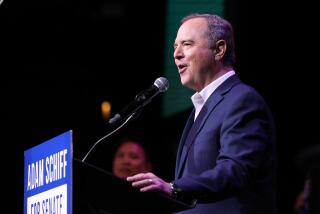Sordid Pasts, Hefty Pockets at Fore of Illinois Senate Race
- Share via
CHICAGO — Today, all the U.S. Senate candidates in Illinois can talk about is their drug use.
Last week, it was wife beating.
The week before? How much money each candidate had in the bank.
The race to fill the open seat currently held by Republican Sen. Peter Fitzgerald has drawn a host of wealthy candidates -- seven of the 15 contenders vying in the Tuesday primary are millionaires. It also has unleashed a Jerry Springer-esque debate over personal morals, drug use and messy divorces.
In Illinois, where politics and controversy often go hand in hand, the Senate primary race has voters and even candidates shaking their heads in bewilderment.
“This is going always to be known as the drugs-slash-sex election,” said Maria Pappas, Cook County Treasurer and one of the eight Democratic candidates. “It’s like ‘Sex and the City,’ but it’s sex and politics. I’d be on the front page and be leading all the polls if my husband had tried to beat me. It’s ridiculous.”
One of the leaders, at least in media headlines, is multimillionaire Blair Hull. The former securities trader, whose net worth is reported to be between $132 million and $444 million, has put an estimated $29 million of his own money into his campaign to become the Democratic nominee, and has said he would go as high as $40 million.
His campaign manager is paid $20,000 a month. Hull reportedly has offered people $75 a day to display his campaign signs in their yards. But Hull is not alone in richly backing his own candidacy.
Jack Ryan -- a former investment banker and teacher worth between $38 million and $96 million -- has given his campaign $3 million of the $4.7 million gathered in his bid to become the top finisher among the Republican contenders.
Other millionaires in the contest -- though they have funded their own campaigns in the thousands-not-millions of dollars -- include Democrats Pappas and healthcare consultant Joyce Washington, and, on the Republican side, dairy owner Jim Oberweis, businessman Andy McKenna Jr., and physician and entrepreneur Chirinjeev Kathuria.
State Democratic Sen. Barack Obama is not a millionaire -- he jokes that his finances are so minimal he could file an E-Z form to the IRS if he hadn’t bought a house -- but he has drawn the attention of the city’s most famous millionaire: sports legend Michael Jordan gave $10,000 to the Obama campaign.
Part of the reason behind the crush of wealthy and not-so wealthy candidates is that there are no clear-cut favorites in either party.
“The mayor does not want to go to the Senate. The Illinois governor does not want to go to the Senate. The attorney general doesn’t want to go to the Senate,” said Kent Redfield, a political studies professor at the University of Illinois at Springfield. “Politically, the farm teams are bare.”
That opened the door for an usually large field of both established and would-be politicians in the primary, Redfield said. It has also meant candidates don’t need to woo as many voters to win a spot on the November ballot.
All they have to do is get more votes than the other half-dozen or so contenders from their party.
“Typically, you only have a few candidates. So you’d need, say, half of the vote,” said David Bositis, senior political analyst at the Joint Center for Political and Economic Studies, a research group based in Washington. “With seven to eight people in each party going for the nomination, you only need 30%. Maybe a little more. Maybe a little less.”
The Democratic candidates pretty much agree with one another on two basic issues -- they are pro-choice and anti-school vouchers. The Republicans also stand in agreement on those issues -- they oppose abortion, favor school vouchers.
What sets them apart is scandal.
Hull, who has based part of his campaign on championing women’s rights, was dragged into a political quagmire when local media reported that he allegedly physically abused his ex-wife, Brenda Sexton. In a 1998 police report, Sexton accused Hull of hitting her in the shin during a dispute. It also described him as a violent man who repeatedly cursed her and one time threatened to kill her.
Hull has dismissed the accusations, saying that Sexton, who received $3.4 million in the divorce settlement, had just been pushing for more money. Sexton, managing director of the Illinois Film Office, could not be reached for comment.
After Hull’s marital problems became public, Ryan released his own divorce documents -- minus pages Ryan said could pose a threat to his 9-year-old son. (Ryan’s former wife is actress Jeri Ryan, whose roles included the human-alien hybrid Seven of Nine in the series “Star Trek Voyager.”)
Fellow Republican candidate John Borling announced that he was aware of information about the withheld documents in the Ryan divorce, but says he finds “this matter distasteful,” and so isn’t discussing what details he may know.
Meanwhile, Ryan’s team launched a campaign of automated telephone calls to registered Republicans, telling them that the focus on his divorce is part of “an unprecedented smear campaign aimed at Jack Ryan and his family.”
And then, there’s the brouhaha over drugs.
This week, candidates began discussing their use -- or lack of use -- of drugs after Obama sad that he had “primarily smoked pot” in high school and occasionally had used cocaine in college.
The subject came up after local media rehashed accounts in Obama’s 1995 autobiography, “Dreams from My Father: A Story of Race and Inheritance.”
Within hours, former Chicago school board president and Democrat candidate Gery Chico announced he had smoked marijuana when he was in college. Hull said that 20 years ago he had occasionally used cocaine and smoked marijuana.
And Pappas, proudly told reporters that she had never used illegal drugs. “You have to react to this roller coaster,” Pappas said. “I just can’t wait until Tuesday.”
As the days roll toward election day, Dan Hynes is eagerly trying to give one last political pitch. Standing outside a train station, shivering from the cold, the Democrat candidate and state comptroller greets a steady stream of evening commuters.
Reaching out, Hynes tries to shake each person’s hand while volunteers pass out fliers touting his economic plan. It’s a traditional way to get his message out, a way to bypass the latest scandal buzz and talk directly to the voters.
When a person stops to greet to the 44-year-old candidate, Hynes introduces himself, with a grin, as an average guy.
“I’m here to talk about jobs,” Hynes said. “I’m not a multimillionaire.”
But later, Hynes tells reporters that he wants to be clear: He, too, has smoked marijuana.
Four times. Back in college.
More to Read
Get the L.A. Times Politics newsletter
Deeply reported insights into legislation, politics and policy from Sacramento, Washington and beyond. In your inbox twice per week.
You may occasionally receive promotional content from the Los Angeles Times.










